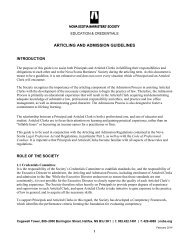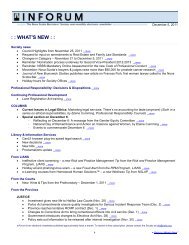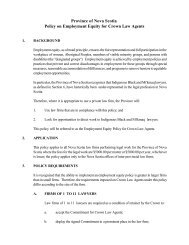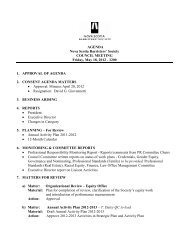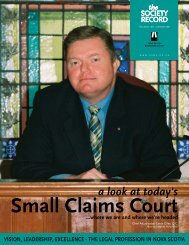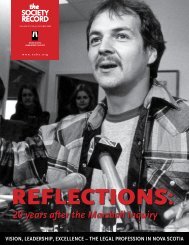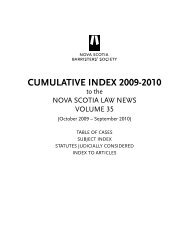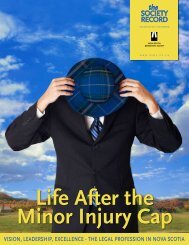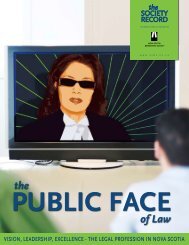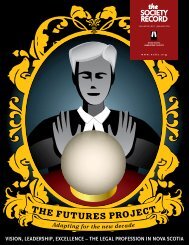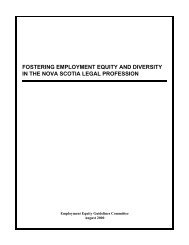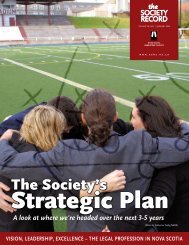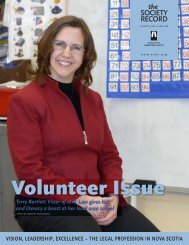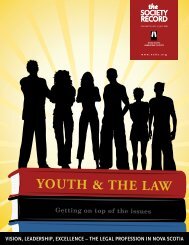the SOCIETY RECORD - Nova Scotia Barristers' Society
the SOCIETY RECORD - Nova Scotia Barristers' Society
the SOCIETY RECORD - Nova Scotia Barristers' Society
Create successful ePaper yourself
Turn your PDF publications into a flip-book with our unique Google optimized e-Paper software.
Detail from portrait by Dorothy E. Vicaji,<br />
presented by Borden to <strong>the</strong> <strong>Society</strong> in 1925.<br />
From <strong>Society</strong> President to Prime Minister of Canada:<br />
Sir Robert Borden<br />
Two former presidents of <strong>the</strong> <strong>Nova</strong> <strong>Scotia</strong> Barristers’ <strong>Society</strong><br />
went on to become prime minister of Canada. The first was<br />
Sir John Sparrow David Thompson (President, 1880-82),<br />
who served from 1892 until his sudden and premature death in<br />
1894. The second was R. L. (Robert Laird) Borden, Prime Minister<br />
from 1911 until his retirement in 1920.<br />
It was during Borden’s decade as an officer of <strong>the</strong> <strong>Society</strong> (1894-1904)<br />
that his distinguished legal career turned into a political one. In many<br />
respects, Borden and Thompson were alike – cerebral lawyers and<br />
reluctant politicians, no less successful and eminent in politics than<br />
<strong>the</strong>y had been in law.<br />
Called to <strong>the</strong> Bar in 1878, Borden probably did not join <strong>the</strong> <strong>Society</strong><br />
until 1882. That year, Thompson was appointed to <strong>the</strong> Supreme Court<br />
of <strong>Nova</strong> <strong>Scotia</strong> and Borden moved to Halifax to replace him in <strong>the</strong><br />
thriving firm at which Thompson had just ceased to be senior partner.<br />
In 1887, Borden turned down an offer from Thompson (by <strong>the</strong>n<br />
Minister of Justice) to come to Ottawa as his deputy minister,<br />
preferring instead to concentrate on growing his already successful<br />
law practice. That same year, Borden was elected a member of<br />
Council and was re-elected annually until 1894, when he became<br />
Vice-President. In 1889, he became<br />
head of his firm. Borden, Ritchie &<br />
Chisholm was <strong>the</strong> premier law office<br />
in <strong>the</strong> city and region.<br />
Barry Cahill<br />
CAPP<br />
Borden’s years as a member of Council, Vice-President and President<br />
encompassed a tense, difficult and uncertain time in <strong>the</strong> <strong>Society</strong>’s<br />
existence – a period of fundamental transition from near powerlessness<br />
to full empowerment. In those days, membership in <strong>the</strong> <strong>Society</strong> was<br />
voluntary and before 1899, it appears that few lawyers from outside<br />
Halifax belonged to it. Indeed <strong>the</strong> <strong>Society</strong>, perceived with good reason<br />
at <strong>the</strong> time to be a quintessential Halifax ‘club’, was exceedingly<br />
unpopular with lawyers from out of town.<br />
Before 1885, <strong>the</strong> <strong>Society</strong> had no official relationship with <strong>the</strong> Bar.<br />
That year, Council acquired limited powers to make rules and<br />
regulations “for preserving and enforcing <strong>the</strong> honour and discipline<br />
of <strong>the</strong> Bar,” but it could only enforce honour and discipline against<br />
those barristers who were members of <strong>the</strong> <strong>Society</strong>. Any lawyer could<br />
join <strong>the</strong> <strong>Society</strong> but none had to, nor did <strong>the</strong>y automatically become<br />
a member upon being called to <strong>the</strong> Bar.<br />
While Vice-President, Borden was <strong>the</strong> driving force behind <strong>the</strong><br />
18<br />
The <strong>Society</strong> Record



